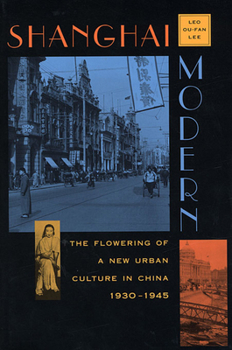Shanghai Modern: The Flowering of a New Urban Culture in China, 1930-1945
Select Format
Select Condition 
Book Overview
In the midst of China's wild rush to modernize, a surprising note of reality arises: Shanghai, it seems, was once modern indeed, a pulsing center of commerce and art in the heart of the twentieth century. This book immerses us in the golden age of Shanghai urban culture, a modernity at once intrinsically Chinese and profoundly anomalous, blending new and indigenous ideas with those flooding into this "treaty port" from the Western world.
Format:Paperback
Language:English
ISBN:0674805518
ISBN13:9780674805514
Release Date:September 1999
Publisher:Harvard University Press
Length:464 Pages
Weight:0.85 lbs.
Dimensions:1.1" x 6.1" x 9.2"
Customer Reviews
3 ratings
Chinese writers analyzed for English readers
Published by Thriftbooks.com User , 19 years ago
I read a library copy of this book and thought it important enough to want to own, so I ordered a copy. The author's premise is commentary about Shanghai based/oriented writers of the 1930-45 period who wrote in Chinese, and he presents an interesting analysis of the works of some of the writers of this time. I was not familiar with the works of many of them, but found myself caught up in the writers' works and thinking, their lives, etc. As a resource, this book is invaluable as the author gives an extensive list of his source readings at the back, and comprehensive footnotes. Some of his writing, however, is heavy-handed. He uses a number of words repeatedly that I did not understand and had to go to a dictionary for help. Nevertheless, I would recommend this book for anyone who wants to know more about China between the World Wars.
Don't miss this book
Published by Thriftbooks.com User , 22 years ago
Whether your rate to "shanghai modern" is high or low, this book is welcomed in some area. It's not because of the information it gives, but because of the way of investigating the culture of "old shanghai" in modern China. You may think this kind of seeing culture and literature doesn't have profound meaning. But this kind of study is at the begining. Moreover, his analysis is not up-to-date thing. (please consult the introduction) You should struggle to collect the right (and many) data if you want to reconstruct the old times of shanghai.If you have difficulty in reading English, then take a look at the translation book which was published by Oxford University Press. The name is "shang hai mo deng".
An excellent introduction to Shanghai's cultural legacy
Published by Thriftbooks.com User , 24 years ago
Shanghai is best known for its negative legacies, "whore of the orient" and all that. But while those foreigners were drinking themselves silly all hours of the day, the city's Chinese residents were building up a world of art and letters that China had not since been able to rival.Authors with a revolutionary bent are better known these days in China. The Chinese Communist Party posthumously revived Lu Xun as a standard bearer, and many other social critics such as Mao Dun, Bing Xin, and Ba Jin saw Communism as the natural out-growth of their ideals. Others, however, were more romantic, more bourgeois, more purely artistic in their vision. They, along with most of Shanghai's leading film-makers, actors, and musicians, flocked en masse to Hong Kong after 1949. Today, Old Shanghai films and literature are far better known and more popular in Hong Kong than they are in Shanghai.That's where Leo Ou-Fan Lee fits into the picture. The Hong Kong native is one of the leading experts on the literary legacy of Old Shanghai, and he brings alive the writing and history of greats such as Zhang Ailing (Eileen Chang) for connoisseurs and novices alike. Lee offers a chapter on the Shanghai film industry, which is not his specialty and is not very strongly presented, apart from an interesting analysis of themes of modernity. His presentation of the huge publishing world pictorial magazines, with glossy spreads and advertisements that are indicative of societal norms and values at the time, proves quite engaging. Granted, the analysis seems to be based on just a few vintage copies of "Liang You" (Young Companion), but as that was a darn good magazine, one can't criticize. His real passion, however, and the strength of the book, are in the literary field. Lee seems to have a bit of a crush on Zhang Ailing, but then again, who doesn't?






